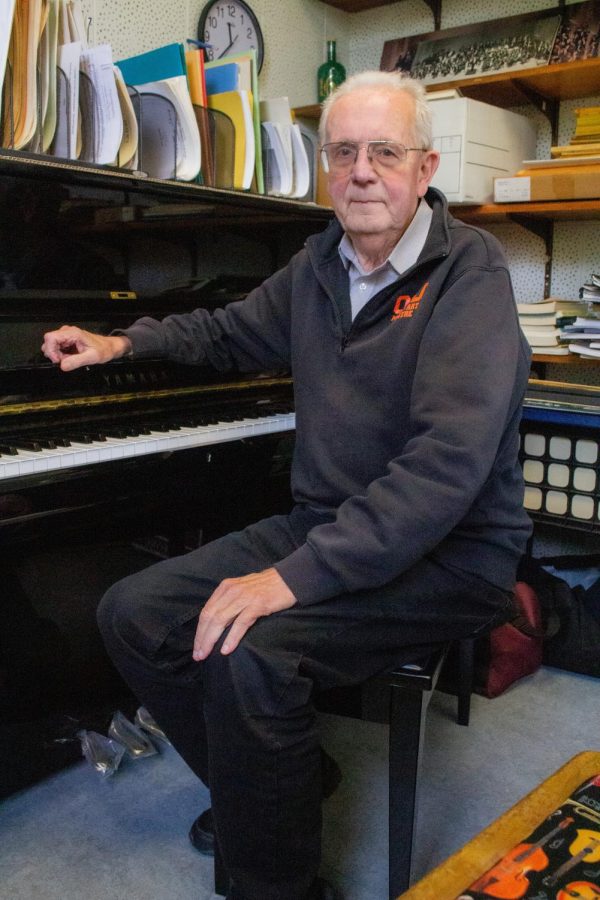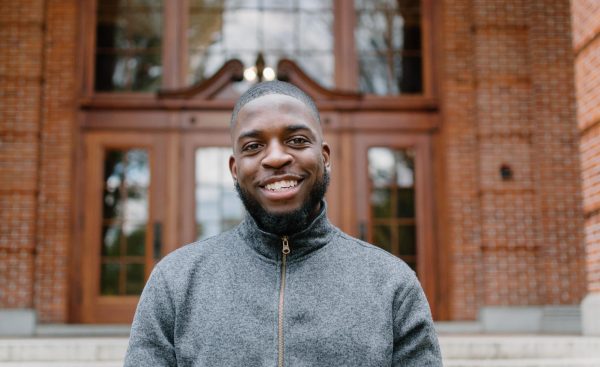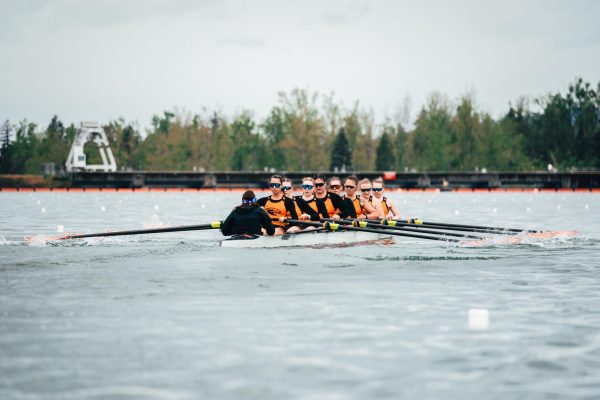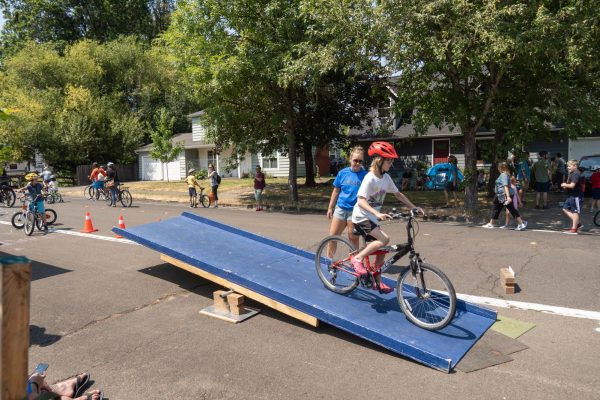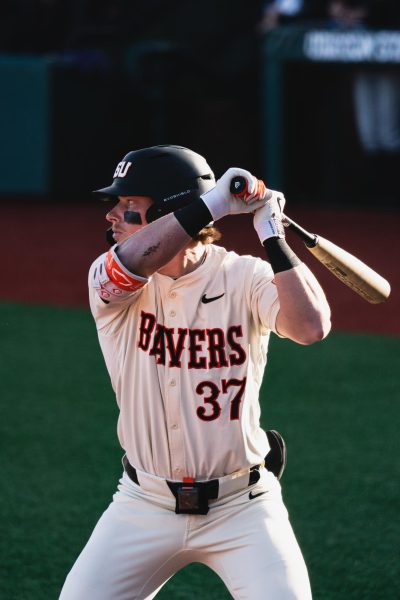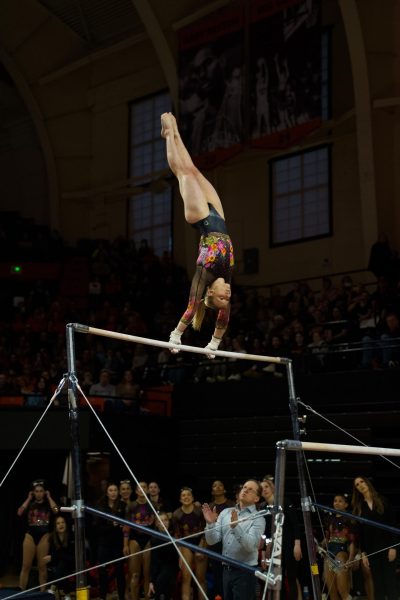Conductor, husband and traveler: Marlan Carlson retires after 54 years at OSU
Retiring symphony conductor Marlan Carlson (he/him) poses for a photograph on June 15 in front of a piano located in his office in Oregon State University’s Community Hall in Corvallis. “All of my training on the East Coast and in Europe has qualified me to teach in many music schools, but I have decided to decline all of those offers,” says Carlson, “Oregon State has allowed me to be an entrepreneur, and I was able to reinvent myself several times.”
July 3, 2023
When describing his life, Music Director Marlan Carlson believed good fortune seemed to rain down on him: from meeting his wife in Illinois to playing in orchestras from London, Germany and Japan.
Carlson is officially retiring on June 30, after a 54-year career at Oregon State University, starting as a violin teacher and ending as music director of the Corvallis-OSU Symphony Orchestra.
“I’ve had so many wonderful students come through here,” Carlson said. “It’s just been a great run.”
Carlson was born in Wayne, Nebraska to parents who were both pianists. His father was a piano professor at the local college, as well as a composer.
Carlson and his brother started playing piano at the age of four, then later violin at ten. Although there were times Carlson wanted to quit, his dad’s financial support was a strong motivator not to.
“There was a little home pressure, but I’m glad I stuck with it,” Carlson said.
His family always played a specific classical radio station from Vermillion, South Dakota growing up in Nebraska. Even now, Carlson claimed there is always a radio on in the house, with music running from the two classical radio stations in Corvallis.
Although he started learning piano six years before the violin, Carlson claimed if he had primarily been a pianist, then he would not have experienced the opportunities he has had, especially abroad.
He performed as principal violinist in the Heidelberg Staedtisches Orchestra, the London Symphony Orchestra and the Tokyo Metropolitan Orchestra. He called himself a small town kid, but was never intimidated by big cities.
While with the orchestra at Eastman School of Music, they did a three month road trip to Europe, Russia and Northern Africa. Before the orchestra was set to play a concert in Aleppo, Syria, a bomb went off outside the concert hall. Lights went out briefly, but the orchestra continued once they came back on.
“I didn’t want to just do what everybody else does: get a good orchestra job or teaching job,” Carlson said. “I wanted to get out of the Eurocentric kind of culture.”
After graduating from Eastman School of Music in 1964, he decided to move to Japan and study Zen Buddhism in Yokohama. He was recruited to the Tokyo Metropolitan Orchestra to be a conductor and principal viola.
According to Carlson, he had no intention of having a career in Japan but he “just kind of got sucked into it.”
Eventually he was convinced to move to London by an old classmate from Eastman, but made a pitstop in the United States where he worked at Millikin University–and also met his wife.
After a short courtship, they both moved to London, where Carlson immediately landed a position in the London Symphony Orchestra.
After a year and a half, Carlson and his wife got the itch to move and be away from English speakers. They decided on Germany, in part due to the country being a hub where composers thrived: Mozart, Bach, Beethoven.
“If I get a good job, a good situation, I’m looking for the next jump,” Carlson said. “That’s always been my history.”
The industry is brutal, and the competition to get into an orchestra is just as competitive as trying to find success in pop music, Carlson said.
Carlson recommends to students who want to play music at a high level to also get their teaching certificate to pay for rent and food.
In 1967, Carlson and his wife bought a $99 round trip ticket from Germany to New York, and another $99 Greyhound bus ticket that lasted for a month.
The two decided to road trip around the West Coast, starting from Vancouver, visiting the music departments at different schools. Carlson was born in the Midwest, and went to school on the East Coast, so he wanted to experience what the West Coast was like as well.
“I think we visited about 25 colleges and universities from Vancouver to San Diego,” Carlson said.
After the road trip, they flew back to Germany and worked for another year before they got a call from the chairman of the music department at OSU around Christmas time to offer Carlson a job.
Two of the reasons he decided to come to OSU was because they also offered his wife a job, and the university allowed him to explore other possibilities and “new ways of doing things.”
Carlson started as a violin teacher and became conductor of the Corvallis-OSU Symphony in 1985. He initially had no interest in conducting but was convinced by one of the band directors at the time.
In addition, he has also served as chair of the music department and resident director of study abroad programs in England, Germany, Italy, France and Austria.
In 2000, following acclaimed concerts in China, Carlson traveled to China over the next decade to conduct professional symphony orchestras in different cities, including Shanghai and Tianjin.
“That’s what I call my Chinese decade,” Carlson said. “From 2000 to 2010, I’d go to China at least once or twice every year and conduct orchestras.”
In 2007, Carlson recorded a CD in the studios of Radio Moscow with the Russian National Philharmonic, including concerti of Glazunov, Scriabin and Tchaikovsky.
The Corvallis-OSU Symphony plays three major concerts each year, one in the fall, winter and spring. The orchestra also plays a children’s concert in February, and a holiday concert in December. They like to play the classics from the 19th and 20th centuries.
Carlson says he runs a “pretty loose ship.” He lets students float in and out as they please, and only holds rehearsals once a week. He understands that students have other priorities and he wants to account for that, calling students “complex these days.”
He even took a moment to recognize his privilege, growing up in a time when nine months of college could be paid off after working a summer job. An agricultural job could even pay for the whole year.
According to him, he did not think he would stay in Corvallis for long and thought he and his wife would move back to Germany after a year.
What is next for Carlson is to focus on improving his Russian language skills. He currently speaks seven languages. According to him, he’s been performing for 80 years, playing thousands of concerts, and it’s finally enough for him.
Colton Byers was a music education major who attended OSU and played trumpet for the orchestra from 2018-2022.
“In 5th grade, band was mandatory at my school,” Byers wrote in an email. “I originally wanted to play saxophone, but my mom is a concert violinist and told me I had to pick something that I could play in a symphony orchestra as well.”
According to Byers, being a member of the OSU Symphony Orchestra was never even a question. His mother played in the orchestra when she attended OSU, and as a community member. So as a kid, Byers would attend concerts and rehearsals.
Byers reached out to Carlson to audition once he graduated from high school and was accepted to OSU.
“(Carlson) is certainly tough and he knows exactly what he wants from the music,” Byers wrote. “He also has a really great sense of humor and would always crack me up with his analogies.”
Byers’ favorite experience with the orchestra were the yearly children’s concerts. The symphony would invite local elementary school students for a concert, where they would “play movie scores like Star Wars and Harry Potter as well as some more ‘traditional’ classical music,” according to Byers.
“I enjoyed talking with (Carlson) about the pieces we played, and he always had great recommendations for what new music to listen to,” Byers wrote.
Byers graduated in 2022 and now works as a band and choir teacher in Portland.












































































































